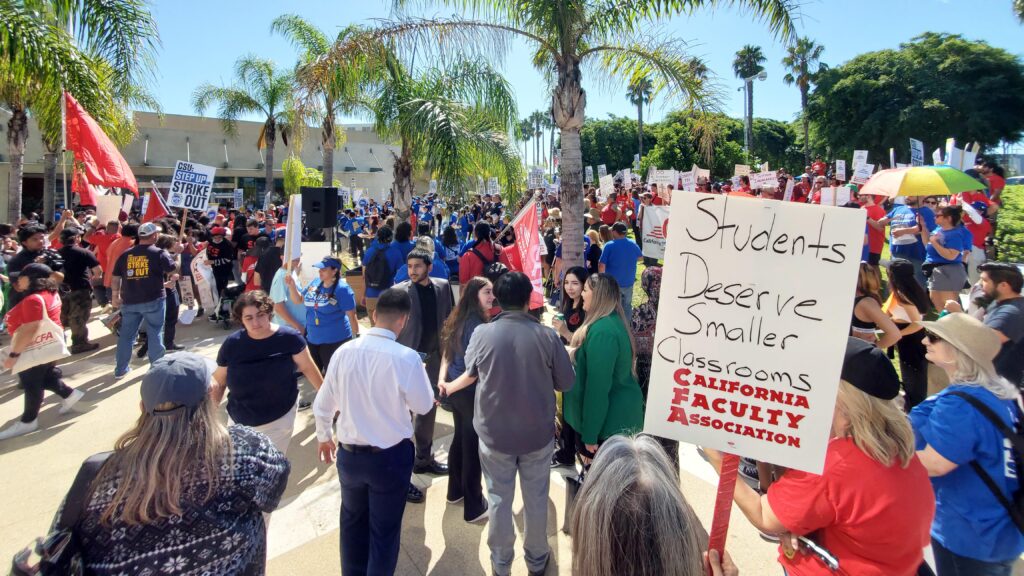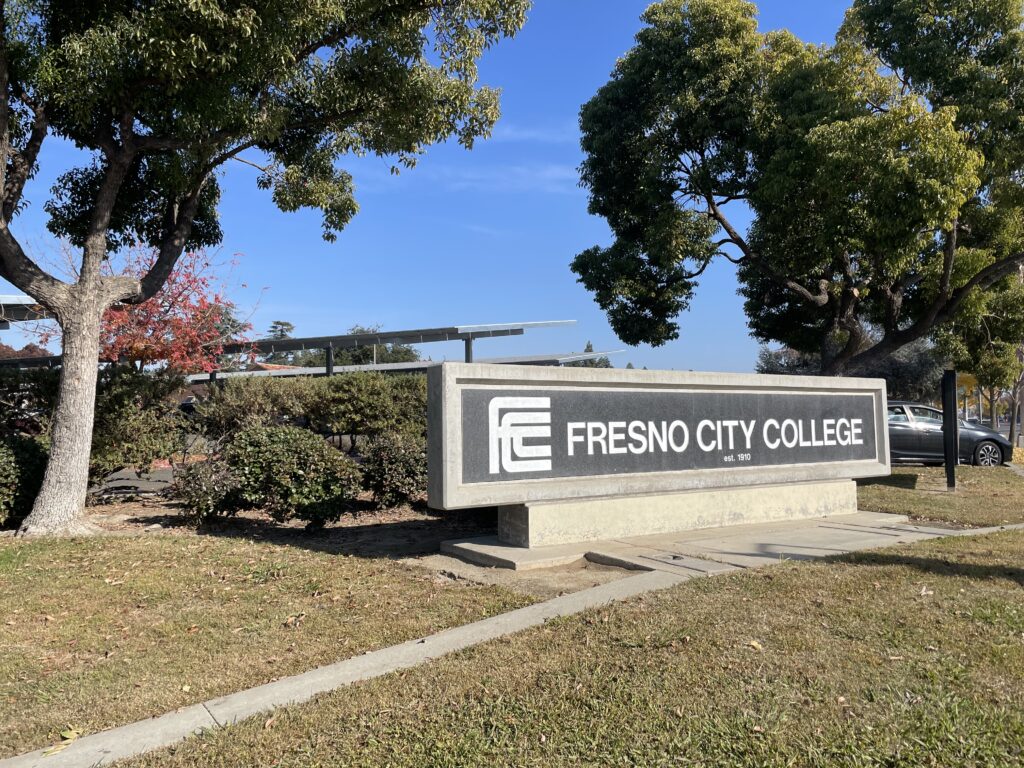
Students, faculty and staff protest a potential tuition increase across the California State University system on Sept 12, 2023.
CREDIT: MICHAEL LEE-CHANG / STUDENTS FOR QUALITY EDUCATION
Thousands of California State University faculty are preparing to shut down their classes and strike for one day next week as labor negotiations have stalled.
The series of one-day rolling strikes will begin at Cal Poly Pomona on Monday, with San Francisco State following on Tuesday, Cal State LA on Wednesday and Sacramento State on Thursday. Some faculty from other campuses are expected to join their colleagues and not teach on those days.
Salary remains the largest disagreement between the 23-campus Cal State system and the California Faculty Association, which represents about 29,000 professors and lecturers. The faculty is fighting for a 12% general salary increase for this year and has not specified the size of the raises it will seek after that. However, the university system is proposing a total increase of 15% over three years, including this year.
“A lot of what we’ve been offered by management is dependent on the state budget,” said Kate Ozment, an English professor at Cal Poly Pomona who will participate in the strike. “That doesn’t work for faculty who have to pay bills right now.”
Many faculty members have student loan debt and want to start families or are struggling to support the families they do have, she said.
“So many of us chose to work for the CSU specifically because we believed in the mission and we believe in the student body,” Ozment said. “The CSU talks a really big game about recruiting first-generation faculty and underrepresented faculty, but the reality is those populations are less likely to have generational wealth to fall back on, and they’re way less likely to have had good jobs that helped them save before they went to graduate school.”
But CSU officials say the system can’t afford to give more than 5% a year to the faculty group.
“We recognize the need to increase compensation, and we are committed to doing so. But our resources are limited, and our financial commitments must be fiscally sustainable,” said Leora Freedman, CSU’s vice chancellor for human resources, during a call with media. “CSU is prepared to return to bargaining with CFA at any time.”
Freedman added that the university system has already successfully negotiated 5% annual increases with four other labor unions. However, negotiations have also stalled with Teamsters Local 2010 representing 1,100 of CSU’s skilled trades workers. The Teamsters also announced they plan to join the faculty in their strike.
“Any larger salary increases would force very difficult and painful decisions on our campuses and would trigger a reopening of salary negotiations with other labor unions,” Freedman said.
In August, the faculty union and the CSU entered a state labor mediation process. A fact-finding report written by a third-party labor negotiator was released by both sides Friday. The negotiator ultimately recommended a 7% general increase in faculty salaries for one year while noting that this would be below the rate of inflation.
In an email to its members, the faculty association said it appreciated the fact-finder’s work but believes the 7% proposal is not enough to address the loss in buying power.
The fact-finding report also highlighted that reaching an agreement has been challenging because the union and the university system have “radically different views” of the ongoing financial situation. The faculty union, as well as some student groups, have argued that the university system can use its reserves to cover expenses like faculty salaries. However, CSU has stated that its reserves are intended for one-time emergency purposes and can’t go to salary increases.
Much of the wage dispute comes as CSU has granted salary increases to campus presidents and hired the new system chancellor with a nearly $800,000 base salary, even as the system faced a budget deficit.
As for the series of one-day strikes, Ozment said at the start of this semester that she alerted her students to the potential disruption of their classes in her syllabus.
“Being a teacher is about transparency and consistency, so I felt that if I told them from the beginning about a possible disruption they would be emotionally and intellectually prepared for it,” she said. “My students have been really upset when they learn how many of their faculty are not paid a living wage, especially how many classes are taught by lecturers who can’t afford rent or are constantly driving from campus to campus in order to put food on the table.”
Ozment said she did receive some concerns about the impact of the strike on grading or the ability to graduate on time even though just one day’s classes will be canceled.
“I told them the same thing that I always tell them, which is: ‘I’ve got your back,’” she said. “There’s going to be a disruption. That’s the nature of the thing I have to disrupt, but I’m disrupting management. I’m not trying to disrupt (students). I encouraged them to be a part of it because the better the disruption, the quicker this is over and the quicker they get the education they deserve.”
Students have also received communications from the chancellor’s office about the strikes and have been encouraged to speak with their faculty members about the impact on their courses and grades. And not every faculty member will participate in the strike, Freedman predicted.
The chancellor’s office is caught between “a rock and a hard place,” she added.
“We need to be responsible and protect the university and our students and our operations,” Freedman said. “At the same time, we also need to pay our employees fairly and competitively. We are in a very tough situation. I wish we had more money. I wish we had more money to use and to make different choices, but we’re very limited.”





